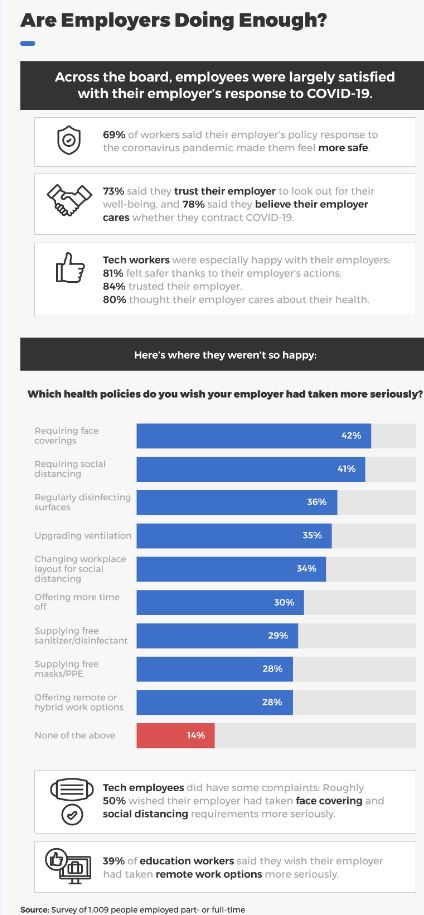As workplaces gradually open back up, both in the UK and elsewhere around the world, employers are going to have to work hard to manage employees’ fears and expectations around infection control and health and safety. Ryan McGonagill looks at what employees are saying and what “pandemic perks” might become a more permanent fixture in the future.
Covid-19 has left its mark on every business differently. Some have gone remote and plan to stay remote indefinitely, while others never left the office in the first place. But as some offices slowly return to business-as-usual, what standards are employers held to?
Building on our earlier research into remote workers’ feelings about working from home and potentially returning to the office, we asked some questions – and found some answers – about what employees expect their employers to do prior to returning to the office.
Have employees held their employers responsible for their safety during the Covid-19 pandemic? Do employees expect their employers to regularly sanitize the office, make social distancing accommodations, or provide time off? We surveyed 1,000 full- and part-time employees in the US to gauge their expectations and determine which “pandemic perks” they want to stick around even after it is safe to stop.

With so much at stake, 93% of surveyed employees said it was important that their company took steps to address the health risks posed by Covid-19. Half of employees think employers are responsible for keeping the workplace safe, with less than 3% shifting that responsibility to employees.
Expectations around social distancing and masking
Of the necessary steps and safety measures, employees expected their employers to continue social distancing in the workplace and mask mandates until it’s safe to stop more than any other coronavirus-related policies.
However, it wasn’t just the immediate future employees were concerned about. Nearly half of employees expected their employer to regularly disinfect surfaces during the pandemic and forever after it has passed.
Forty-one per cent of employees also expected their employers to offer free sanitiser or disinfectant forever, while 39% expected their employer to keep the option to work remotely around well after Covid-19. While a surprising 8% of employees didn’t want their employer to require face coverings, 11% said it was a policy they hoped would stick around.

Workplaces pose a great risk to employees in the time of Covid-19. Regardless of the office’s size, working in-office typically means coming into close contact with others for more than 15 minutes – an easy way to catch the virus.

An overwhelming majority felt at least a little unsafe across every health hazard listed. However, workplaces that failed to address employees coming to work despite having symptoms made employees feel the most unsafe.
While just 9% said they would be totally fine with their employer ignoring the issue, 60% said they’d feel very unsafe if their employer didn’t address those with symptoms, while 20% and 12% said they would feel somewhat and a little unsafe, respectively. Employees also said workplaces that didn’t enforce face coverings or make room for social distancing would make them feel very unsafe.
Of course, employees’ safety sentiments differed depending on the industry they worked in.
Tech workers tended to be more moderate than other industries in their anxiety about each health factor, over half on average having said they would feel just “a little” or “somewhat” unsafe across the board with regard to the various health risks.
On the other hand, education workers were more polarized in their views on certain health risks – a whopping 72% of education workers were on either side of the spectrum of the face covering requirement policy, selecting either “very unsafe” or “not at all unsafe.”
However, it wasn’t just industry – remote workers were also nearly twice as likely to report anxiety about the option to work remotely. Compared to only 23% of on-site workers, 41% of remote workers said they would feel very unsafe if their employer failed to offer remote work.
Despite their varying concerns, employees are largely satisfied with their employers’ handling of the pandemic. While 69% of surveyed workers said their employers’ policy response to the coronavirus pandemic has made them feel safer, 73% said they trust their employer to look out for their wellbeing.
While 69% of surveyed workers said their employers’ policy response to the coronavirus pandemic has made them feel safer, 73% said they trust their employer to look out for their wellbeing.”
A whopping 78% also believed their employer cared whether they contracted Covid-19, with tech workers reporting the highest happiness levels with their employers.
Regardless of the precautions taken and level of satisfaction with preparedness, employees still believed their employers could have done more. Forty-two percent of employees wished their employer had taken mask requirements more seriously, while 41% said the same of social distance requirements.
Regularly disinfecting surfaces and upgrading ventilation were also common steps employees said they wish their employer handled better. Nevertheless, 14% of employees said their employer handled everything just right.
Conclusions – striking a balance but taking proper precautions
Now, more than ever, your safety in the workplace is inextricably linked with your safety at home. Approaching an unprecedented pandemic is a unique and taxing challenge for business owners.
Sign up to our weekly round-up of HR news and guidance
Receive the Personnel Today Direct e-newsletter every Wednesday
While some employers struggle to find the right balance between employee safety and their bottom line, others are willing to sacrifice typical workforce aspects if it means maintaining their employees’ health.
Despite some wishes for more serious facial covering and social distancing requirements, employers have successfully eased most employees’ anxieties by taking the proper precautions, providing the necessary equipment, and offering remote work.
